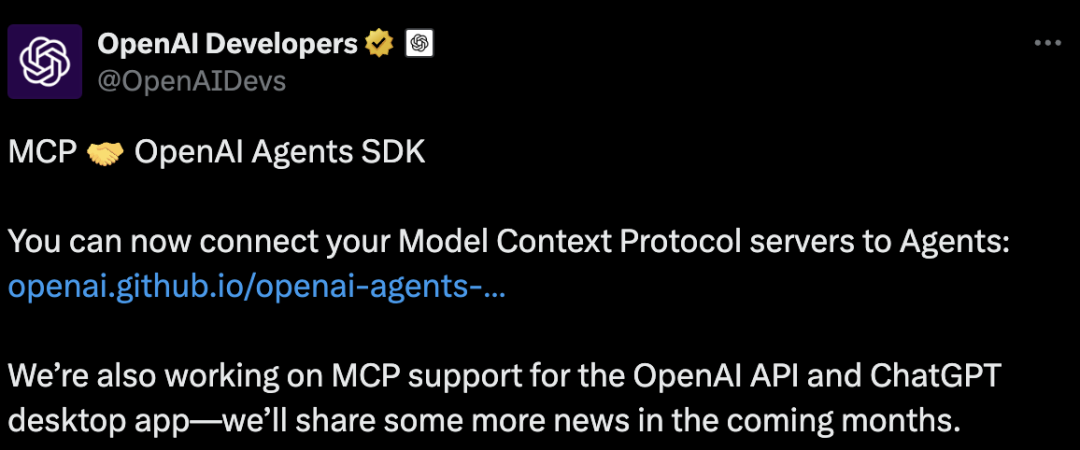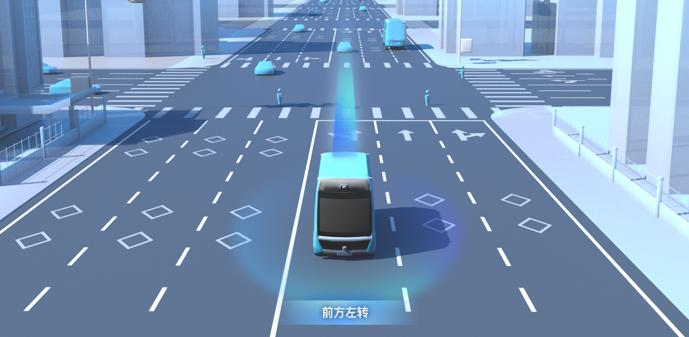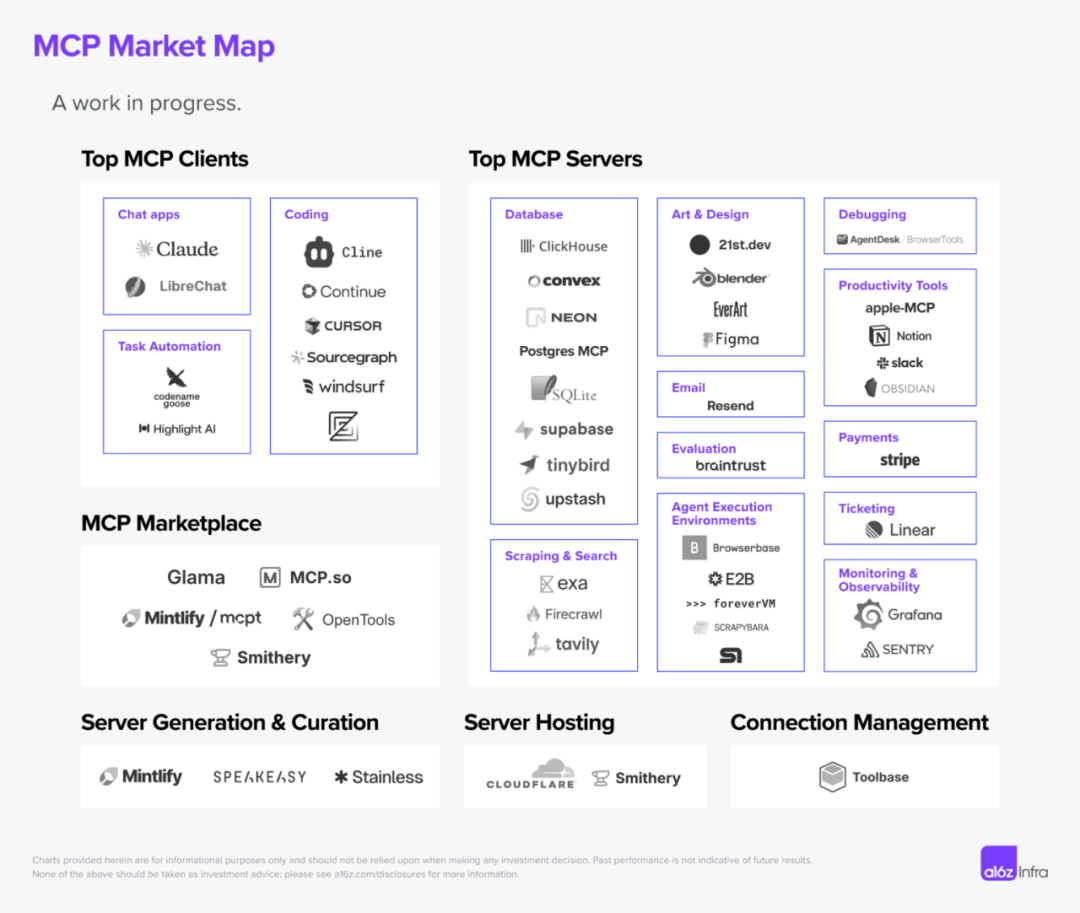MCP: Vision for Agent Collaboration Pathways and AI Network Integration
![]() 04/01 2025
04/01 2025
![]() 578
578
In March 2025, OpenAI's formal adoption of competitor Anthropic's MCP protocol standard sent shockwaves throughout the AI industry. OpenAI CEO Sam Altman tweeted, "People love MCP, and we're thrilled to support it in our products." Prior to this, the industry widely speculated that OpenAI would leverage its robust technical prowess to launch a proprietary protocol to compete with MCP. However, OpenAI's decision undoubtedly reinforces MCP's status as an industry standard.

Since its launch in late 2024, MCP (Model Context Protocol) has been hailed as the "USB-C of AI applications." As a universal interface, it allows AI assistants to securely access external resources such as content repositories, business applications, and development environments, providing a standardized solution for AI models to interact with the outside world. Now, with OpenAI's adoption, MCP's industry influence has expanded further, heralding a new era in AI agent collaboration and network integration.
Ecosystem Synergy: Breaking Down AI Model Silos
In the rapid evolution of AI technology, collaboration among diverse AI models has become crucial for driving industry progress. For OpenAI, embracing MCP means its models can seamlessly integrate into the same ecosystem as other AI models, including Anthropic's Claude, Google's Gemini, and various open-source LLMs. This cross-compatibility significantly benefits developers, enabling them to flexibly swap or use multiple models in the backend without writing specific integration code for each model.
Imagine a complex AI network where multiple agents each perform specific tasks—some responsible for image recognition, others focused on natural language processing, and still others adept at data analysis. Through MCP, these agents can collaborate efficiently and uniformly, akin to a precision machine where each component works in harmony to complete complex tasks. For instance, in autonomous driving scenarios, AI models need to process real-time information from vehicle sensors, cloud map data, and roadside infrastructure. With MCP, different AI models can easily share and integrate this data, leading to more precise decisions and enhanced driving safety.
Furthermore, collaboration among multiple agents within an AI network can spawn innovative application scenarios. For example, based on MogoMind's AI network technology path, real-time digital twin data and in-vehicle image-text data can be integrated to enable richer interactive experiences. In the medical field, AI agents can collaboratively analyze patient medical records, imaging data, and real-time vital sign monitoring information, providing doctors with more comprehensive diagnostic support and improving medical efficiency and quality.

Unified Standard: Building a Seamlessly Connected AI Network
By adhering to the MCP standard, OpenAI's models can easily access various enterprise data stores and tools through existing MCP servers. This direct data access capability allows models to generate more accurate and relevant responses using real-time information. In physical AI scenarios, sensory-computational data can also achieve mutual access between vehicle, road, and cloud ends through the AI network, thereby quickly improving efficiency and ensuring safety.
Consider intelligent transportation systems. AI models on vehicles need to communicate in real-time with roadside sensors and cloud-based traffic management centers. Through MCP, data from these different endpoints can flow seamlessly within the AI network, enabling vehicles to adjust their routes based on real-time traffic conditions and traffic management centers to more efficiently schedule and manage traffic flow, thereby reducing congestion and improving road efficiency. In the industrial manufacturing sector, AI models in factories can access real-time operational data from production equipment, supply chain management systems, and quality inspection equipment through MCP, enabling intelligent production scheduling and quality control, optimizing production processes, and reducing costs.
The establishment of a unified standard not only enhances the performance and efficiency of AI models but also drives standardization across the industry. Much like the HTTP protocol in the internet era, MCP is poised to become one of the infrastructures of the AI era, laying a solid foundation for the widespread application and popularization of AI technology.

Cost Reduction and Efficiency Enhancement: A Powerful Tool for Simplifying Integrated Development
For corporate teams, adopting MCP significantly simplifies the complexity of integrated development. If a team simultaneously uses services from OpenAI and other AI providers, they may need to maintain multiple different integration pathways. However, MCP's universality allows all teams to perform unified integration, thereby reducing development and time costs.
Essentially, when interacting with external systems, OpenAI models will use a "common language" consistent with the language used by many other AI tools. This consistency not only improves development efficiency but also reduces potential errors and risks associated with different integration pathways. By addressing all data and model pathway integration issues through a single "AI network," enterprises can devote more resources and energy to innovation and optimization rather than spending extensive time on tedious integration tasks.
For instance, in the financial industry, banks need to integrate customer data, transaction data, and market analysis data from multiple channels to provide personalized financial services. With MCP, the bank's AI models can easily access and integrate this data, quickly generating accurate customer profiles and risk assessment reports, thereby improving customer service quality and business decision-making efficiency. Simultaneously, banks can reduce business disruptions and errors caused by data integration issues, lowering operational risks.
The Race for Agent Communication Protocols
As more technical teams and enterprises join the research, development, and application of MCP, we have reason to believe that MCP will continue to improve and develop, becoming one of the core standards of the AI era. In this race for agent communication protocols, those who can take the lead in breaking through technical bottlenecks and introducing more efficient, secure, and user-friendly protocol standards will dominate the future AI market.
Building a unified, open, and efficient AI network is not only a technological imperative but also a crucial driver of social progress. Let us jointly anticipate that, under the impetus of protocols like MCP, AI agents will better collaborate and integrate, creating a brighter future for humanity.








